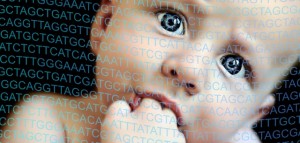The Crude World of Baby Making
 The Huffington Post reports that the Food and Drug Administration has been asked to approve creation of “genetically modified children.” The FDA announced a meeting aimed at analyzing the proposed practice of “oocyte modification in assisted reproduction for the prevention of transmission of mitochondrial disease or treatment of infertility.”
The Huffington Post reports that the Food and Drug Administration has been asked to approve creation of “genetically modified children.” The FDA announced a meeting aimed at analyzing the proposed practice of “oocyte modification in assisted reproduction for the prevention of transmission of mitochondrial disease or treatment of infertility.”
In other words, a type of very early eugenics.
In addition, such manipulation of the embryonic person is appealing to the transhumanist movement which functions under most people’s radar. “Three parent embryos” is right up this movement’s alley because transhumanists believe that the very nature and identity of a human being should be redefined and its nature replaced with “persons” such as cyborgs, avatars, and posthumans (a species different from and superior to Homo sapiens). The World Transhumanist Association states:
“Transhumanism” has gained currency as the name for a new way of thinking that challenges the premise that the human condition is and will remain essentially unalterable. Clearing away that mental block allows one to see a dazzling landscape of radical possibilities, ranging from unlimited bliss to the extinction of intelligent life. In general, the future by present lights looks very weird—but perhaps very wonderful—indeed.
Anything that touches even tangentially on the expanding definition of a human being attracts the transhumanist ideologues.
Taking matters a bit further, the Journal of Medical Ethics published an article on the future of in vitro generated gametes that addresses the possibilities of moving BEYOND the three-parent embryo—far beyond it. As writer Michael Cook tells it, “The controversy over three-parent embryos could soon be old hat.” He quotes the JME article on the subject of “multiplex-parenting” which defines it as “a radical expansion of reproductive autonomy that allowed more than two persons to engage simultaneously in genetic parenting.”
Further,
“IVG could permit instead a much more substantive sharing of genetic kinship, through what is in essence a generational shortcut. Imagine that four people in a relationship want to parent a child while being all genetically related to her. IVG would enable the following scenario: first, two embryos would be generated from either couple through IVF with either naturally or in vitro generated gametes. hESC lines would be then established from both embryos and differentiated into IVG to be used in a second round of IVF. The resulting embryo would be genetically related to all four prospective parents, who would technically be the child’s genetic grandparents.”
From the pro-life standpoint, this is all terribly concerning. We know that with the birth of the first in vitro fertilization baby in 1978 there came a world of procreative technology that has never stopped expanding.
In fact, surrogate parenting opportunities—the practice of a third party carrying the child of another couple, for example infertile couples or homosexual/lesbian couples—are now offered on Craig’s List for “$30,000 base pay.”
Is it any wonder that, in 2004, Pope John Paul II told the Pontifical Academy for Life that practices like in vitro fertilization represent “a technology that wants to substitute true paternity and maternity and therefore that does harm to the dignity of parents and children alike”? Ten years ago he prophesied that the dangerous manipulations of the processes of “artificial procreation” would not stop with IVF. Today we are seeing how true those words are as we witness the debate about how many parents a human embryo could potentially have when the laboratory replaces the maternal safe house we call the womb.
In Switzerland, where the debate surrounding surrogate parenthood has come into the forefront in recent days, the bishops of that nation have not been silent. Swiss bishops have said that “surrogate motherhood violates the dignity of the child, ‘who is condemned to develop in a strange womb,’ as well as the dignity of the woman, ‘who sells her body.’” Further, the Swiss bishops’ commission said surrogate motherhood is an “expression of the liberal individualist view of society.”
It is long past time for the United States Conference of Catholic Bishops to speak as well. The crude world of baby making is taking us to a place we should never be willing to go.

